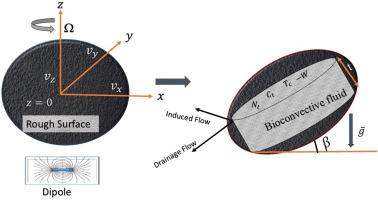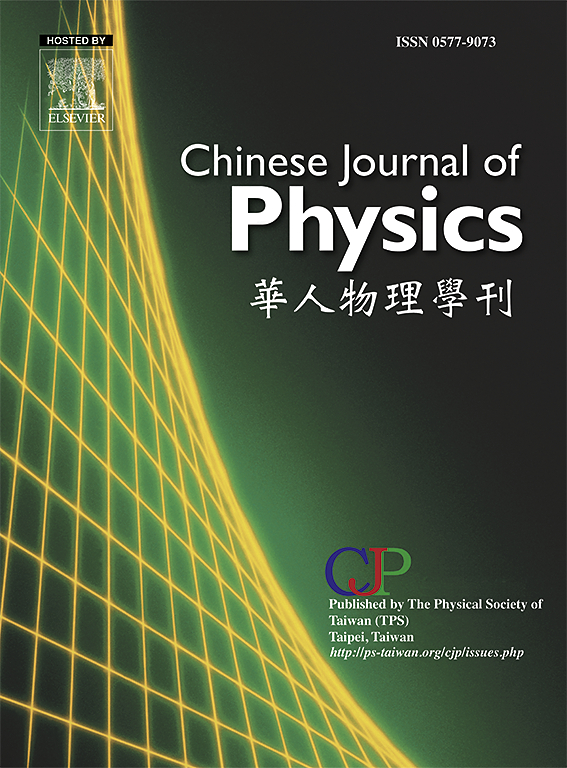Effect of thin film thickness of ferrofluid on inclined bioconvective flow
IF 4.6
2区 物理与天体物理
Q1 PHYSICS, MULTIDISCIPLINARY
引用次数: 0
Abstract
This research examines the effect of variable thin film thickness on the bioconvective ferrofluid flow through a rotating sloped surface when a magnetic field (dipole) is present. Similarity transformation is used to standardize the current model's governing equations. By using a finite element method, the normalized nonlinear differential equations are numerically solved. Variable thickness of ferrofluid thin film and bioconvective parameters (bioconvective Lewis number, bioconvective Peclet number, and micro-organism concentration difference) yield the following results: velocity profiles (radial, tangential, and axial), gravity flow (drainage velocity and induced velocity), temperature profile, concentration profile and microorganism profile. In addition, this investigation examines the density of moving microorganisms as well as local heat and mass transport. The temperature, concentration, radial, axial, drainage, induced, and motile microbe velocity are all improved with increasing film thickness. Variable thickness increases local heat transfer whereas increasing Brownian motion and thermophoresis parameters decreases it. This study could be helpful for self-sterilizing applications and biomedical engineering.

铁流体薄膜厚度对倾斜生物对流的影响
本研究探讨了在存在磁场(偶极子)的情况下,可变薄膜厚度对流经旋转斜面的生物对流铁流体的影响。相似变换用于标准化当前模型的控制方程。通过使用有限元方法,对归一化非线性微分方程进行数值求解。铁流体薄膜厚度和生物对流参数(生物对流路易斯数、生物对流佩克莱特数和微生物浓度差)的变化产生了以下结果:速度剖面(径向、切向和轴向)、重力流(排水速度和诱导速度)、温度剖面、浓度剖面和微生物剖面。此外,这项研究还考察了移动微生物的密度以及局部热量和质量的传输。随着薄膜厚度的增加,温度、浓度、径向、轴向、排水、诱导和移动微生物速度都有所改善。厚度的变化会增加局部传热,而布朗运动和热泳参数的增加则会降低局部传热。这项研究有助于自消毒应用和生物医学工程。
本文章由计算机程序翻译,如有差异,请以英文原文为准。
求助全文
约1分钟内获得全文
求助全文
来源期刊

Chinese Journal of Physics
物理-物理:综合
CiteScore
8.50
自引率
10.00%
发文量
361
审稿时长
44 days
期刊介绍:
The Chinese Journal of Physics publishes important advances in various branches in physics, including statistical and biophysical physics, condensed matter physics, atomic/molecular physics, optics, particle physics and nuclear physics.
The editors welcome manuscripts on:
-General Physics: Statistical and Quantum Mechanics, etc.-
Gravitation and Astrophysics-
Elementary Particles and Fields-
Nuclear Physics-
Atomic, Molecular, and Optical Physics-
Quantum Information and Quantum Computation-
Fluid Dynamics, Nonlinear Dynamics, Chaos, and Complex Networks-
Plasma and Beam Physics-
Condensed Matter: Structure, etc.-
Condensed Matter: Electronic Properties, etc.-
Polymer, Soft Matter, Biological, and Interdisciplinary Physics.
CJP publishes regular research papers, feature articles and review papers.
 求助内容:
求助内容: 应助结果提醒方式:
应助结果提醒方式:


